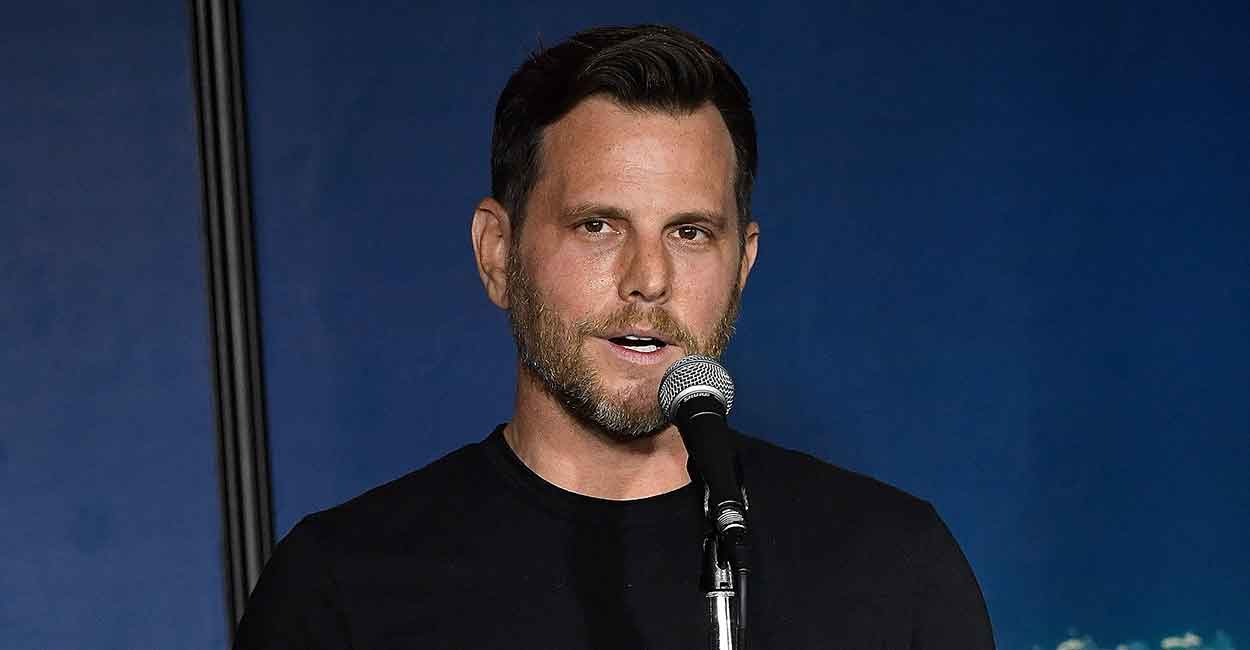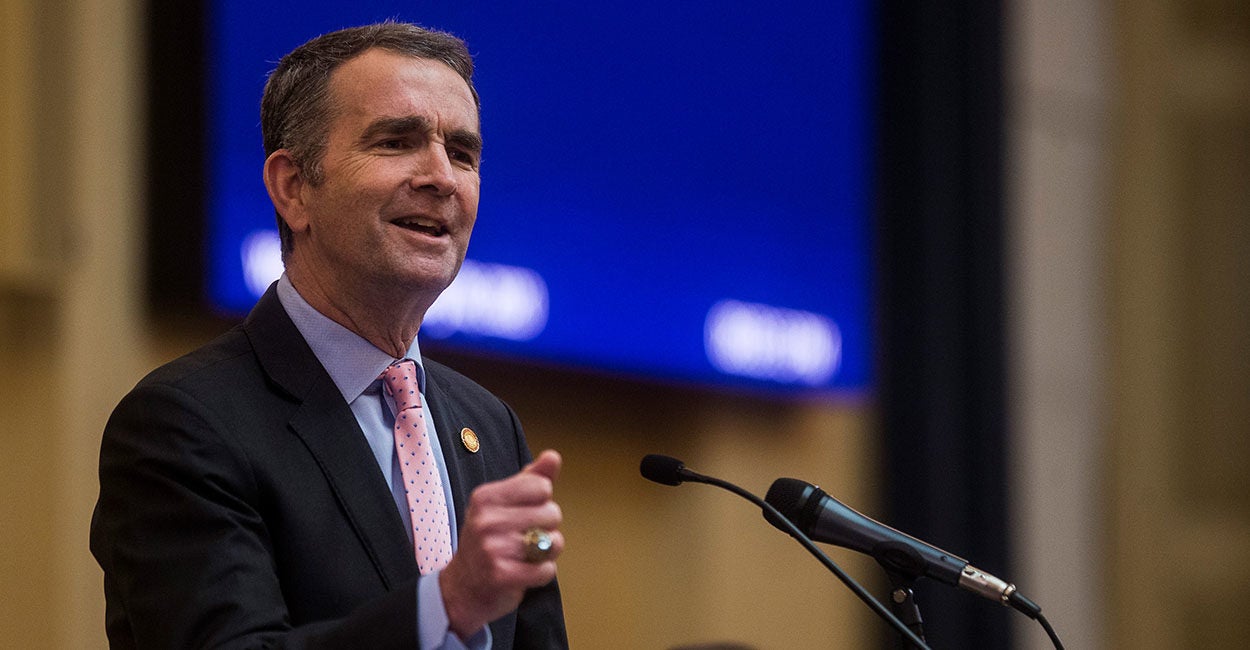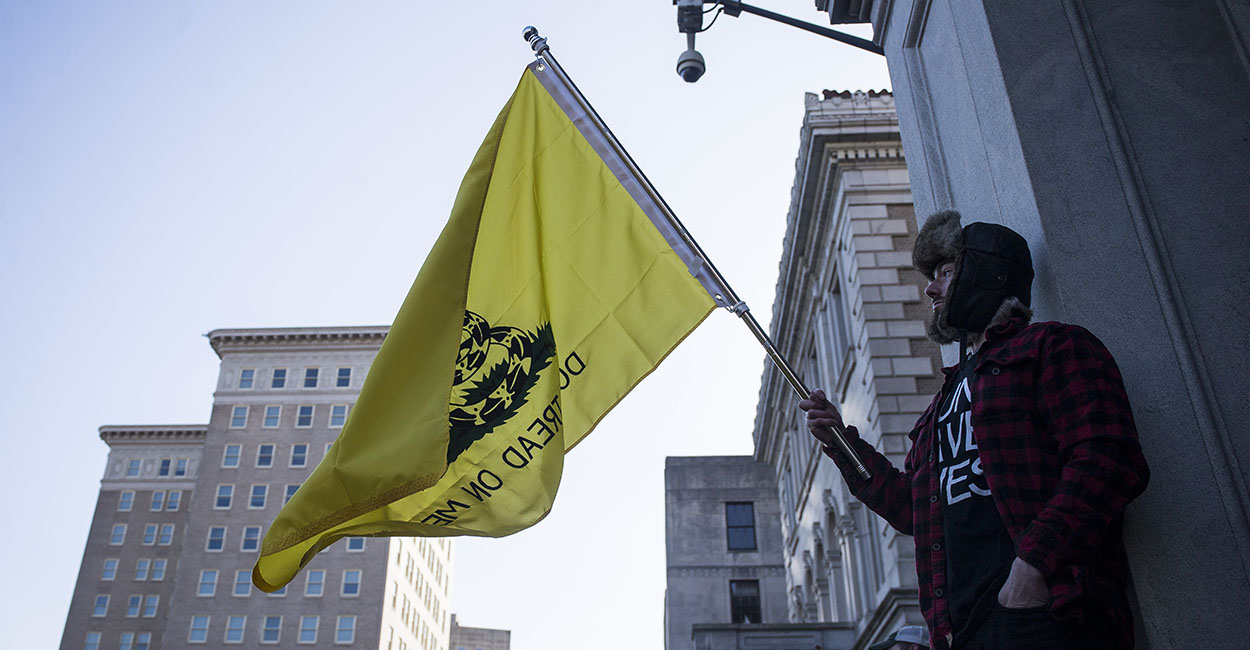‘Cowed Into Silence’: Dave Rubin Warns of Cancel Culture, Mob Mentality
Dave Rubin, who hosts “The Rubin Report” talk show, joins the podcast to discuss the differences between political liberalism and classical liberalism, his recent encounter with Antifa, and the “cancel culture” phenomenon. Read the lightly edited interview below or listen to the podcast:
Podcast : https://shows.acast.com/thedailysignal/episodes/013020
Virginia Allen: I’m joined on The Daily Signal Podcast by Dave Rubin, a former liberal and now host of the BlazeTV show “Rubin Report.” Dave, thank you so much for being here.
Dave Rubin: Thanks, it’s good to be here. For the record, believe it or not, even at a Turning Point Student Action Summit, I still do consider myself a liberal in the true sense—
Allen: Yes.
Rubin: … of liberalism. I always feel that that’s important to say.
Allen: Well, let’s start there. Define what that difference is.
Rubin: It’s funny because, in essence, a true liberal, a classical liberal, means that you really believe in two things.
Most importantly, you believe in the individual, so you want individual rights for everybody. Meaning that everyone that is in this great country of the United States with 340-some odd million people, I want everyone that is here legally to have equal rights regardless of gender, or sex, or color of their skin, or national origin, as long as they’re a citizen, etc., etc.
So you believe in the individual above the group. So you believe in the individual above collectivism, let’s say, and that you want the light touch of government.
I know that doesn’t sound very far from conservatism. And by the way, it’s actually not very far from conservatism, which is why I always say now that defending my liberal principles is becoming a conservative position.
Unfortunately, the left and progressives have really mangled the word liberal because, actually, I think if you whittled down what most people here—the 3,000 students at this conference—believe, most of them actually when they say they are conservatives, they now are trying to conserve some essence of liberalism.
I know that’s a little technical and sometimes not the most fun thing to talk about, but it is important because liberalism has nothing to do with leftism, and I think [that is] the thing that I started talking about a few years ago that woke a lot of people up.
Allen: No, that’s a very important distinction to make. So for you, was there a certain moment when you realized that the progressive ideologies that you had held to … no longer really represented you?
Rubin: There were a couple of things that happened over a couple of years actually. At first, I think what happens is leftism, and progressivism, and wokeism, and identity politics, all of these things, these are just the factory settings that we’re all sort of set off with.
Especially for you guys in college now, it’s like you guys are inundated with somehow Democrats, good; Republicans, bad; lefties, nice; conservatives care about money and war; lefties like poor people. All of these things that are not true, but between culture and the way the media works, they all start sort of feeling true. And to break out of those factory settings is very dangerous.
I would prefer that the factory settings be that we’re all individuals and we would prefer that the government not do everything for us and take care of us like we’re incapacitated. But there are moments where we need some government involvement. That’s the way I would rather the base point be.
But we seem to do it the other way, where the government’s supposed to do everything and if you can escape the government, you’re OK. That’s actually much more of a socialist collectivist view of the world.
For me, there were a couple things that broke me out of it, which I’ve talked a lot about. So I’ll give you a different one, because I talked about a few of them in my speech earlier.
One of them was when the Charlie Hebdo attacks happened in January of 2016. Charlie Hebdo was this incredible magazine, satire magazine, in France that had been fighting the power and making fun of government, and making fun of religion, and making fun of all the institutions in France. Forever France has an incredibly rich history of satire.
As you may remember, several Islamists, jihadists, in effect, broke into their offices and killed a bunch of cartoonists. And what I saw happen on the left suddenly was everyone was saying, “Oh, we shouldn’t draw cartoons about things that upset people. We shouldn’t talk about these issues, all of these things.”
And I thought, “Something is deeply wrong here.” We have to be able to talk about bad ideas. We have to be able to make fun of things. That’s the essence of what makes us free. That’s just one of many things that sort of woke me up to what was happening on the left.
And then, and really in a broader sense, it was identity politics more than anything else. The idea that I could sit across from you and say, “Well, OK, here is a white girl of, say, 20 years old. I must know what she thinks about these things.”
What a horrible way of looking at the world. I would hope, and I suspect, that you have all sorts of thoughts that you’ve come up with on your own and that you like to sort of battle out ideas, and hopefully we’ll do some of that right here. That is what you’re supposed to do as a human.
Unfortunately, what the left is offering is, “Oh, you’re born with certain characteristics. That’s how you’re going to be treated forever.” By the way, that Martin Luther King Jr. guy, that was the reverse of what he said.
Allen: For you, as you battled out those ideas and tried to figure out, “OK, what do I think about these issues?”, what were some of those individuals that you really gleaned from, or listened to, or books that you read that were really, really helpful for you?
Rubin: Well, the most famous one is that I did an interview with Larry Elder, when I was still holding onto some of my lefty stuff.
Larry Elder [is] a conservative who happens to be black, that’s just a piece of it, [he] just beat me over the head with facts. I said something about systemic racism, he turned it on me, I didn’t know what I was saying. And he bludgeoned me with facts until I finally sort of had to wave the white flag and go, “Man, this guy actually knows what he’s talking about.” I had to start reevaluating things.
So I would say that interview with Larry Elder probably single-handedly woke me up more than anything else. And by the way, there are millions and millions of views on dozens of clips on YouTube of this. And it’s hilarious because they all say, “Larry Elder Destroys Dave Rubin.”
But then if you look at the comment section, everyone’s like, “I kind of like Dave. He actually took the hit and changed after that.” So it became a really nice moment. I don’t know how many people can say that their best and worst career moment were at the exact same time, but I can truly say that.
I would say reading any of Thomas Sowell’s books on economics, on the libertarian side truly changed me. Randy Barnett, who’s a constitutional law professor from Georgetown University, who talks a lot about the foot vote, why we need states’ rights, really affected me. And people like Peter Thiel; obviously Jordan Peterson; having debates with Ben Shapiro, even on the things that we disagree on.
What I found is that people on the right generally are pretty open and decent. And just because you disagree with them, they don’t think you’re evil. And that’s very refreshing these days.
Allen: You talk a lot about how critical it is for us to be standing up for free speech at this point in time. And this is something that we kind of take for granted in America. We’re born with it. It’s just, “Oh, of course we have free speech.” But how do we really stand against this progressive movement that we’re seeing increasingly on college campuses to really tamper free speech?
Rubin: There is only one answer to it and it sounds cliche, but I truly believe it’s the only one that will work in the long term, which is: Be brave. Be brave.
If you are 19, 20, you’re in college right now, you live in the freest society in the history of the world. And if you’re walking around right now, are self-censoring yourself, well, we’ve lost already. And maybe we have, I don’t think we have. And if we have, I’m still going to keep doing it. So that’s just my burden, I suppose. But you must be brave.
Everyone, the world over, is envious of the United States. We have the First Amendment. That means the government cannot jail you for speech. The government cannot compel your speech. And we’re suddenly walking around afraid to say what we think, afraid to say simple things.
I’m not even talking about crazy, over-the-top things or racist things or being evil or mean. … I meet young libertarians all the time who will say something like, “I’m for low taxes.” And someone will say, “Well, then, you’re racist.” And it’s like, “What?”
And they can explain it. They’ll say, “Well, if they say you’re for low taxes, that means you don’t want to help poor people. And if you don’t want to help poor people, that somehow means you don’t want to help black people, even though there’s more poor white people than black people.” I mean, a series of nonsensical things that they’ve created.
But you better be brave enough to say what you think because you’re right. Freedom doesn’t just magically appear. The Founders ingrained freedom in the documents that have fostered more freedom in these 200 years than anywhere else. But it doesn’t just stay forever. It doesn’t just stay because it’s a piece of paper. We got to keep fighting for it.
I think it’s on you guys now, the college-age conservative or I would say even just more liberty-minded people, it’s on you guys to fix this thing because, unfortunately, the people before you have sort of mucked it up.
Allen: … Not too long ago, you were in Canada for an event and you had an encounter with Antifa?
Rubin: Yeah.
Allen: Can you talk a little bit about that?
Rubin: I mean, Antifa, which they liken themselves as antifascists, right? That’s what Antifa is supposed to mean. But they actually use the tactics of fascists. Fascists use violence to silence their opponents. That’s exactly what Antifa does. But they flip everything on reality. So they’ll call you a fascist.
The event that I did … was with Maxime Bernier, he’s from the People’s Party of Canada, which is, in effect, their libertarian party. So this is just a guy who wants people to live free. I’ve never heard him say anything racist or anything like that. He’s a very lovely man.
But the opener of the event was a Muslim from Canada, who immigrated to Canada, who gave a wonderful speech. But then you have me up there.
We had us talk about … freedom and all these decent, lovely ideas. There was nothing mean or racist or homophobic or transphobic or any of these other buzzwords. But Antifa was outside. They were stopping people from entering.
The clip that went viral was a woman, a 70-some-odd-year-old woman in a walker, was trying to cross the street and they’re in her face screaming that she’s a Nazi and a bigot. Meanwhile, they’re screaming at her husband also who fought the Nazis in World War II. I mean, you can’t make this stuff up.
And these people have become empowered and emboldened because governments and media sort of just let them get away with it. And it’s super, super dangerous and we need to start calling it out for what it is.
You are welcome to protest. When I do talks, as I did here today, I ended the talk and what did I say? “If you disagree with me, come up first.” I always do that.
But you can’t stop people from entering a venue, you can’t shout people down. The more you do that, you shred the very social contract that we have that allows a society to exist. And a lot of people want to burn things down right now. I would rather build things.
Allen: It’s a good perspective to have.
Rubin: Yeah, why not, right? It’s a little harder, but I would rather it.
Allen: All right. “Cancel culture”—That’s a term we’re throwing around a lot, [that] we’re hearing a lot about. You’ve spoken very boldly on this. Can you first define cancel culture and then explain why it is so dangerous?
Rubin: Well, cancel culture is basically the idea that if you say anything that’s against progressive orthodoxy of the day—and that’s the key part of it, that it’s of the day. Whatever they believe to be OK on any given day—that you could be canceled.
And in effect, what canceled means is that the Twitter mob—usually it starts on Twitter—will assault you and then they’ll go to where you work, they will go to your sponsors. If you’re a public person, they will make your life hell until you apologize.
And everyone knows the apology is always inauthentic. Everyone knows the apology is nonsense, but they want you to bow forever. What they’re trying to do is make you submit so that you’ll never say anything again.
So the great example of this is what’s happening right now, as we’re doing this, is two days ago, J. K. Rowling of “Harry Potter” fame, she tweeted in effect that “Men and women have different biological differences.”
Of course, everyone knows that to be true. That’s not an anti-trans statement. The woman’s a lefty. She’s a progressive. Nobody wants trans people to be treated differently under the law, but you can’t deny biological reality. That is not a bigoted statement. But the mob descends on her.
Suddenly media starts writing pieces about how she is a transphobe and a bigot. And GLAAD comes out against her. And the Human Rights Campaign comes out against her.
So far, from what I can tell, she stood up to it. But other celebrities, that all they did was like her tweets, Mark Hamill (Luke Skywalker)—the whole point of “Star Wars” is to stand up against fear—he had to apologize for liking her tweet.
These people are embarrassing. It’s embarrassing. You’re going to apologize for saying that men and women have differences. We have differences that are biological. Doesn’t mean I’m better than you. Doesn’t mean you’re better than me.
But in essence, cancel culture is this idea that if you take any non-woke statement and you put it out there, that they can come and get you for it. And we all need to stand up against it.
Allen: College campuses have become such a bastion of this very progressive thinking. So what advice do you have to young people who are conservative but find themselves living among so many liberals, so many people, like we defined at the beginning, not classical liberals, but really that progressive thinking?
Rubin: Two things—and this is exactly what I said in my speech. No. 1, be a little bit better than them. That doesn’t take a lot of work. It really doesn’t.
I mean, these people are often outraged, and angry, and hostile. There’s a reason they’re screaming. Be a little bit better. Meaning, turn the other cheek. Don’t be a pushover, but just when you get into a heated debate with one of these people and they’re screaming at you, don’t scream back. Really try your best at all times to be as calm and rational, as decent as possible.
I think you can actually affect people that way. You know what I mean? If they’re just pushing, pushing, pushing, and you give them a little room, sometimes they’ll just run out of push because they often don’t know what they’re talking about.
So I say be a little bit better, but not to be a patsy, you know what I mean? That’s No. 1.
No. 2, and this is the important one. We have a massive bravery deficit in this country right now. Good people. I suspect many of these people that are watching us right now, who are not bigots and who are not racist, have been cowed into silence because they don’t want the cancel culture and the mob to come for them. They’re preying on that silence. …
For example, when they tried to take out Tucker Carlson, he’s one of the ones they tried to take out all the time.
I have differences with Tucker. I really disagree with them on the big tech stuff right now where he wants government intervention and I don’t. I don’t think that makes him a bad person, I think we have a different political opinion.
But when they’re trying to take out Tucker, it’s not really Tucker that they’re trying to take out. … For The Daily Signal, what they’re trying to signal to everybody else is, “See, if we can take out Tucker, we can take out any of you.” And that’s what, especially when you’re college age, you’ll never be braver than you are right now. You will never be braver than you are right now.
You don’t magically get out of college and hopefully you’re going to find someone that you love and get married and have kids, and maybe you’ll have a dog and a car payment and a mortgage. And then you’re not going to suddenly be 28 and be like, “Now I’m brave and I’m going to take on the world.”
Right now, you can do whatever you want. You’re young, you’ve got all of your life ahead of you where you can define what the world that you’re going to live in will be. We’ll go ahead and do it because … it doesn’t get easier. It’s not easy now, but life is not easy, right?
What would Jordan Peterson say, right? “This is chaos. This is turmoil.” You can figure out a way to put together some pieces here that will make sense. But you better do it, otherwise, they’ll come for you. It just is how it is.
Allen: Dave, thank you so much for your time.
Rubin: Yeah, my pleasure.
Allen: Its been a great discussion.
Rubin: I’ve enjoyed talking to you.
Allen: Really appreciate it.
Rubin: Thanks.








